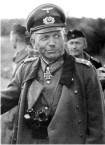Aurelian
Posts: 3916
Joined: 2/26/2007
Status: offline

|
quote:
ORIGINAL: matt.buttsworth
Historically,
except for the turn south to Kiev, key German generals such as Mainstein in Lost Victories argue the Wehrmacht had a chance in 1941 except for Hitler's orders.
This also, if one agrees with Suvorov, was also due to Stalin placing the Soviet armies in the wrong posiitons in 1941 as he prepared to attack Germany, allowing them to be surrounded and destroyed by the Germans.
I therefore believe two things:
1 - for the sake of the Game and historical accuracy, a good German player should have the chance of reaching Moscow in 1941 and winning the war.
In my game I could stop the Germans approacing Leningrad, them stop them approaching Moscow, allowing them only to advance in the South which could not be held, but could be retaken in the blizzards.
For me, this was too easy, and was not the historical reality.
Thoughts?
How close have people got to Leningrad?
Who has reached the suburbs of Moscow by the 10th of December 1941 as the Germans did?
Again balance.
2 - if this is not accepted in the standard scenario a survorov scenario should be created placing the Soviet forces in an extremely dangerous position, to give the germans a chance in the GC. If anyone is interested I would be willing to cooperate iwth someone to help them create this.
3 - If someone is willing, it would be fun as a historical possible variant that never happened, to create the suvorov variant, as one in which on June 15th, the Soviets attacked first.
Anyone interested in helpng create these?
Do other players believe Mainstein that the Germans did ever have a chance of winning in 1941?
All comments will be eagerly read.
Dr Matthew Buttsworth
The problem with reading books such as Mainstein's is that they take all the credit for what worked, ans blame Hitler for each and every failure. They all say "If we did this, then this would happen." What they fail to realize, or gloss over, is that since they did A, and the Russians did B, and it failed, if they did C, it would of worked. Because they think the Russians would still do B.
To quote from "August storm: The Soviet strategic offensive in Manchuria":
Our view of the war in the east derives from the German experiences of 1941 and 1942, when blitzkrieg exploited the benefits of surprise against a desperate and crudely fashioned Soviet defense. It is the view of a Guderian, a Mellenthin, a Balck, and a Manstein, all heroes of Western military history, but heroes whose operational and tactical successes partially blinded them to strategic realities. By 1943-44, their “glorious” experiences had ceased. As their operational feats dried up after 1942, the Germans had to settle for tactical victories set against a background of strategic disasters. Yet the views of the 1941 conquerors, their early impressions generalized to characterize the nature of the entire war in the east, remain the accepted views. The successors to these men, the Schoeners, the Heinricis, the defenders of 1944 and 1945, those who presided over impending disaster, wrote no memoirs of widespread notoriety, for their experiences were neither memorable nor glorious. Their impressions and those of countless field grade officers who faced the realities of 1944-45 are all but lost.
This imbalanced view of German operations in the east imparts a reassuring, though inaccurate, image of the Soviets. We have gazed in awe at the exploits of those Germans who later wrote their personal apologies, and in doing so we have forgotten the larger truth: their nation lost the war-and lost it primarily in the east against what they portrayed as the “artless” Soviets.
As for the fall of Moscow giving Germany the win, well, it wasn't going to happen. Stalin had no plans to quit the war. To do so would of in all likelyhood led to his overthrow and execution.
Perhaps Axis players should spend some time here: http://www.matrixgames.com/forums/tm.asp?m=2705668
This is worth the read as well: http://fmso.leavenworth.army.mil/documents/e-front.htm
"This German period of war historiography embraced two genre of works. The first included memoirs written during those years when it was both necessary and sensible to dissociate oneself from Hitler or Hitler's policies. Justifiable or not, the writers of these memoirs did just that and essentially laid blame on Hitler for most strategic, operational, and often tactical failures. Thus, an apologetic tone permeated these works. Officers who shared in the success of Hitler's armies refused to shoulder responsibility for the failures of the same armies. Only further research will judge the correctness of their views."
< Message edited by Aurelian -- 2/7/2011 1:23:11 AM >
|
 Printable Version
Printable Version
















 New Messages
New Messages No New Messages
No New Messages Hot Topic w/ New Messages
Hot Topic w/ New Messages Hot Topic w/o New Messages
Hot Topic w/o New Messages Locked w/ New Messages
Locked w/ New Messages Locked w/o New Messages
Locked w/o New Messages Post New Thread
Post New Thread